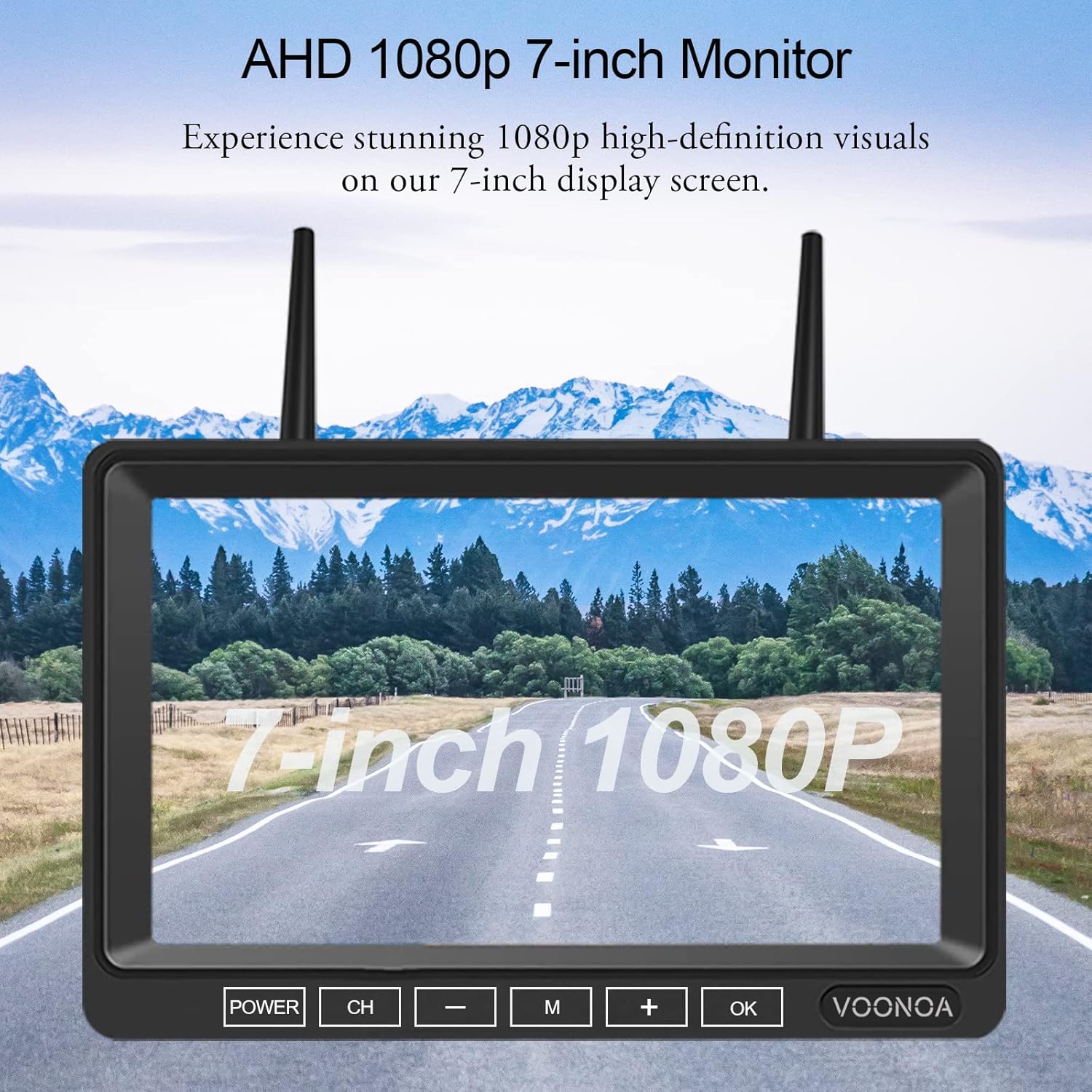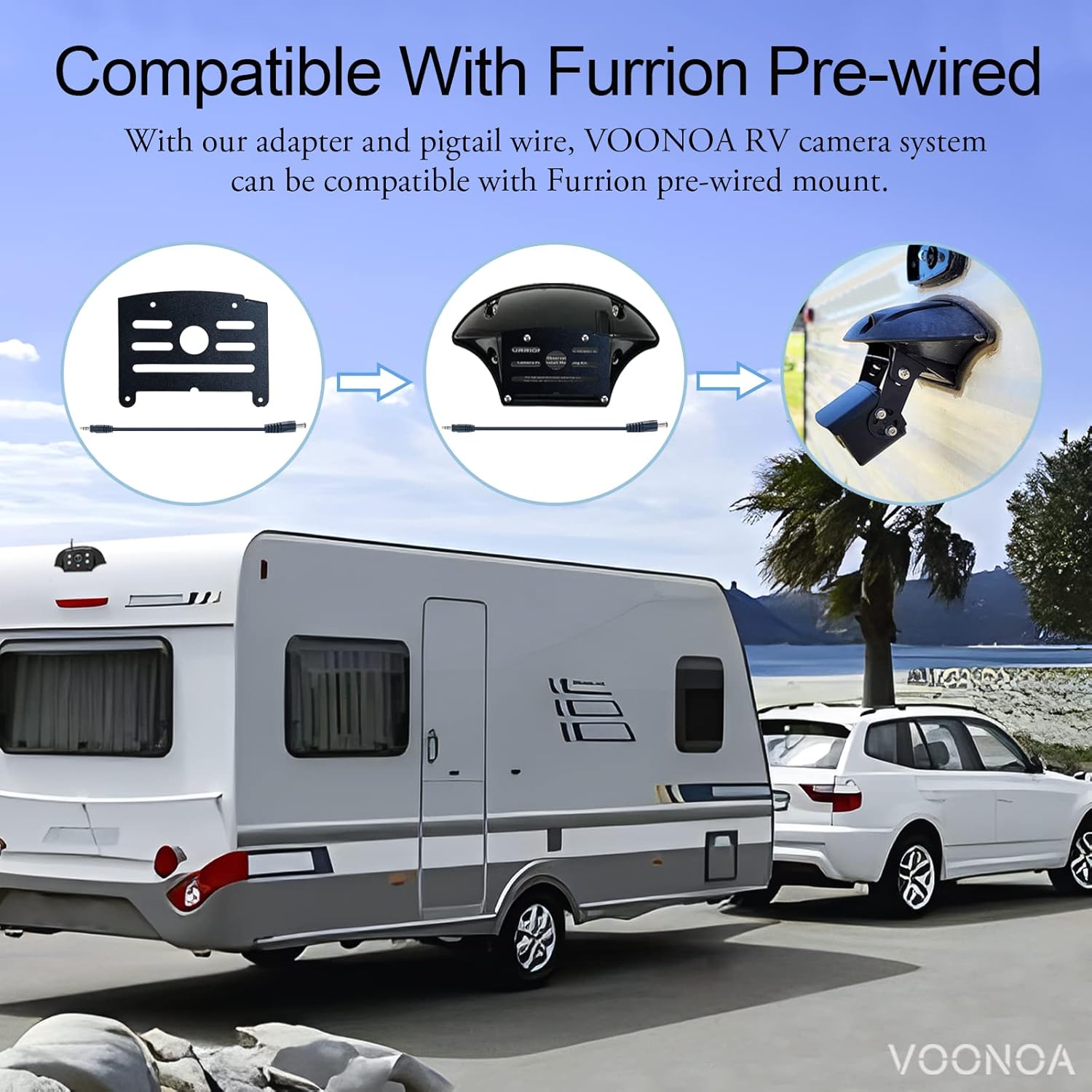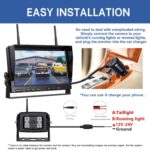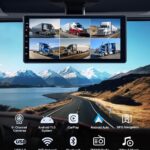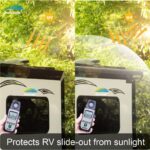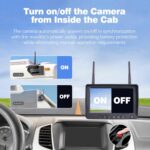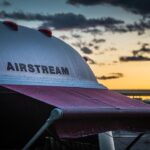Looking for a reliable wireless backup camera system to improve visibility and safety around your RV?
Product Overview
You’ll find that the “1080P Wireless RV Camera System, IP69 Waterproof Night Vision Backup Camera Side Rear View Camera with 7 Inch HD Monitor for RV Truck Trailer Camper” is pitched as an all-in-one solution for RV, truck, trailer, and camper drivers who want better situational awareness. This system promises easy installation, a 360° camera setup, strong wireless transmission, 1080P HD video, and rugged weatherproofing.
What’s included in the kit
You get a monitor and four wireless cameras: front, rear, and two side cameras to help create a 360° perspective around your vehicle. The package usually also contains mounting hardware, power cables, and a user manual, plus a dual-antenna receiver that pairs with the monitor.
Who this is for
If you drive an RV, tow trailers, or frequently park in tight spaces, this product is designed to make your life easier and safer. It’s particularly useful if you want a wireless setup that avoids long video cables running through the vehicle.
1080P Wireless RV Camera System, IP69 Waterproof Night Vision Backup Camera Side Rear View Camera with 7 Inch HD Monitor for RV Truck Trailer Camper
$299.99 In Stock
Quick Installation and Setup
The manufacturer advertises a plug-and-play setup with no wires between the cameras and the monitor, so you won’t have to route video cables through the RV chassis. You’ll only need to provide power to the monitor and cameras, mount them, and pair them following the manual.
Mounting and physical setup
Mounting the cameras is straightforward: you’ll attach them to the front, back, and sides using the provided brackets or screws. You should plan camera placement before drilling, testing angles with a temporary mount if possible to minimize repeat adjustments.
Pairing and initial configuration
Pairing the cameras to the 7-inch HD monitor is typically a simple process: power on the monitor, power the cameras, and the monitor’s receiver should automatically lock onto each camera signal. You’ll want to check each camera feed and adjust angles while viewing the live picture to get optimal coverage.
Design and Build Quality
The cameras are described as having fully metal housings and advanced sealing technology, aimed to withstand harsh conditions and long service life. The monitor is compact and designed for dashboard or windshield mounting with a suction cup or bracket.
Hardware feel and materials
When you handle the cameras, you’ll notice a sturdy metal construction that gives a sense of durability beyond cheap plastic models. The monitor feels solid as well, with a clear plastic screen and a user-friendly layout of buttons.
Weatherproofing and temperature resistance
These cameras are rated to handle extreme conditions, with a waterproof rating of IP69K and an operating temperature range from about -4℉ to 149℉. That means you can rely on the system across cold winters and hot summer days without constant worry about failure from the elements.
Video Quality and 1080P Performance
This system uses a CCD color sensor to capture 1080P full HD images, which generally offer crisp, clear visuals for safer driving. The monitor provides a 7-inch display that helps you see details like obstacles, hitch points, and lane edges.
Clarity and color reproduction
You’ll notice good color fidelity and sharpness in daytime scenarios, where the 1080P resolution helps identify small details at short to medium distances. Motion artifacts are minimal thanks to a relatively stable frame rate and decent encoding.
Latency and real-time feedback
The strong digital wireless signal and dual-antenna design aim to keep latency low, so you won’t face significant lag when reversing or making maneuvering decisions. For most users, the response time is sufficient for safe, confident driving in everyday situations.
Night Vision Capabilities
The cameras are equipped with four powerful large LED lights and light sensors to improve low-light performance, helping you drive or park safely after dark. Night performance will vary with environmental conditions, but the added lighting and sensor tuning provide meaningful improvement over cameras without active illumination.
How the LEDs help
Those built-in LEDs provide an active light source to illuminate close-range obstacles and license plates during reversing or close maneuvers. You’ll still want to be cautious about very dark or highly contrasting scenes, where glare or overly bright LEDs might wash out nearby details.
Practical nighttime results
In real-world night scenarios you’ll see clearer outlines and shapes near the vehicle, reducing surprises when backing up or aligning a trailer. Far-field clarity remains limited by physics and ambient lighting, so you should not treat night vision as a substitute for careful driving.
Wireless Signal Strength and Range
The system uses a dual-antenna design and an updated signal chip to provide a strong, stable digital wireless connection. The manufacturer claims up to 500 ft in open areas and about 320 ft on RVs, which is a solid range for the intended use cases.
How obstacles affect range
Keep in mind that metal structures, multiple walls, and other electronic systems on large RVs can reduce effective range; however, the dual antennas and digital transmission help mitigate interference. You should expect very stable connectivity for typical RV layouts but test the range in your specific rig.
Signal stability during motion
Because the monitor and cameras maintain a digital link, the video feed remains relatively consistent even while driving, reversing, or turning. You’ll notice fewer dropouts than with older analog wireless systems, although very extreme interference or obstacles can still cause temporary interruptions.
Camera Placement and 360° Coverage
With four cameras—front, rear, and two sides—you’ll be able to cover blind spots and achieve near-360° visibility if you position them well. The system gives you the flexibility to focus on reversing, lane changes, or obstacle detection.
Recommended camera positions
Place the rear camera centered and slightly above the bumper line for usable field of view while reversing. Mount side cameras midway down each side at a height that avoids low obstructions like wheel wells but captures the adjacent lane close to the vehicle.
Achieving overlap and minimal blind spots
Aim to overlap the fields of view slightly so no gaps appear between the front, rear, and side feeds. You’ll likely need small angle adjustments during the initial drive to minimize blind spots and ensure useful perspective for hitching or close maneuvers.
Monitor and User Interface
The 7-inch HD monitor is designed for clear viewing and intuitive controls, with buttons for switching camera sources and adjusting settings. Your daily use will be straightforward, with a single monitor providing multiple camera views.
Screen clarity and mounting options
The screen provides a readable resolution for checkbacks, and the mounting options include a suction cup for windshield mounting or a bracket for more permanent setups. Placement should give you an unobstructed line of sight without blocking driver vision or distracting from driving tasks.
Controls and on-screen information
The monitor’s buttons are simple to use for cycling cameras, adjusting brightness, and toggling grid lines if available. You’ll appreciate how easy it is to switch views in tight maneuvers and how rapidly you can access settings while parked.
IP69K Waterproofing and Durability
The cameras’ IP69K rating indicates protection against close-range high-pressure, high-temperature washdowns, and the metal housing helps protect internal components. You’ll find the system appropriate for off-road use, salty environments, and situations where water exposure is frequent.
What IP69K really means for you
IP69K is one of the highest protection ratings for ingress resistance, so splashes, heavy rain, and pressure washing shouldn’t damage the cameras. Still, ensure connectors are sealed and you mount them correctly so water can’t build in mounting channels or cable entry points.
Long-term reliability expectations
Given the temperature tolerance from -4℉ to 149℉ and robust housing, these cameras are built to last if installed and maintained properly. Regular checks of mounting points and seals will keep things reliable for years.
Power Requirements and Wiring
Although the video link is wireless, you’ll still need to provide power to each camera and to the monitor. Power wiring is simpler than a wired video system but requires planning for a clean, protected power source.
Camera power options
Many RV owners wire the cameras to the vehicle’s reverse light circuit for rear camera activation and a switched power source for constant cameras like a front-facing unit. You should consider fusing each camera and routing cables to avoid pinch points and potential chafing.
Monitor power and backup
The monitor typically runs from the vehicle’s 12V system and can be hardwired or connected through a cigarette lighter adapter depending on your preference. Wiring the monitor to a switched source ensures it powers on with the vehicle and avoids draining batteries when parked.
Performance in Real-World Driving
You should expect improved situational awareness when backing up, changing lanes, and maneuvering in campsites or parking lots. The crisp 1080P images and multi-angle coverage reduce reliance on mirrors alone.
Parking and trailer hitching
For trailer hitching, the rear and side cameras give you useful alignment cues; the HD resolution helps you see hitch components clearly at close ranges. Practice is still required, but the system shortens the learning curve and reduces the number of attempts needed.
Highway driving and lane changes
When driving on highways or busy roads, side cameras help you check blind spots for safer lane changes. The wireless signal stability keeps the feed useful at speed, though visually scanning mirrors and blind spot sensors (if equipped) remains crucial.
User Support and Warranty
VOONOA provides unlimited tech support and a two-year replacement policy, which gives you some peace of mind if you encounter issues. The manual included in the package contains additional setup tips and troubleshooting steps to help you get started.
Tech support experience
Having access to tech support can help you resolve pairing, mounting, or power configuration questions quickly. You should keep the purchase invoice and product serial information handy in case you need warranty service.
Warranty caveats and process
The two-year replacement policy typically covers manufacturing defects, but you should read the warranty terms for exclusions like physical damage or improper installation. Contact the vendor or manufacturer directly for replacement procedures and shipping instructions.
Setup Tips and Troubleshooting
You’ll save time if you test camera positions and signal strength before finalizing mounts. Common troubleshooting steps include checking power connections, re-initiating pairing, and verifying antenna orientation.
Common issues and solutions
If a camera feed drops, check the power and antenna connections first, then reposition the camera or monitor to minimize obstructions. For interference or dropout, try slightly changing monitor placement and ensure the monitor antenna is upright and unobstructed.
Optimizing image angles
Adjusting tilt and rotation while watching the live feed helps you find the most useful field of view quickly. Lock mounts firmly after adjustments to prevent vibration-driven drift during long trips.
Safety Considerations and Best Practices
While the system enhances visibility, it’s not a substitute for safe driving habits and mirror checks. You’ll want to use the cameras as an additional safety layer while maintaining situational awareness.
Using the system responsibly
Use the monitor for backing and close maneuvers, but continue to check mirrors and look around when changing lanes or navigating complex traffic. The cameras extend your senses, but they can’t read intentions of other drivers or entirely compensate for low visibility in severe weather.
Maintenance and inspections
Regularly clean lenses, confirm seal integrity, and check that mounts and screws remain tight after rough roads. Address any corrosion, loose connectors, or physical damage promptly to maintain reliability.
Pros and Cons
You’ll appreciate the robust feature set, but there are practical trade-offs to consider before buying.
| Pros | Cons |
|---|---|
| True wireless video between cameras and monitor—no video cables running through the RV | Cameras still require power wiring to each unit |
| 1080P Full HD resolution with CCD sensor for clear images | Night vision is improved but still limited by physics and very dark conditions |
| Quad-camera system for near-360° visibility | Monitor is 7 inches—larger displays may be preferable for some users |
| IP69K-rated metal housings for heavy-duty weather protection | Metallic RV structures may reduce effective wireless range in some layouts |
| Dual-antenna digital wireless signal with up to 500 ft open range | Setup requires careful planning for camera angles and power routing |
| Unlimited tech support and 2-year replacement policy | Some users might prefer integrated vehicle wiring kits for power |
Comparison with Alternatives
When comparing with wired systems, you’ll find the lack of long video cables is a major convenience, but wired video systems can be marginally more immune to RF interference. Compared to cheaper single-camera wireless kits, this VOONOA system gives you real multi-angle coverage and better image quality.
Wired vs wireless trade-offs
Wired systems often provide rock-solid stability and may be easier to integrate with factory monitors, but they require significant labor to route cables. You’ll save installation time with this wireless solution but should still plan for power cabling.
Feature parity with other 1080P kits
Many competing kits offer 720P or lower resolutions; choosing a 1080P system means better detail capture and more useful images for hitching and reversing. If you prioritize image clarity and multi-camera coverage, this VOONOA kit ranks well among mid-tier offerings.
Who Should Buy This
You should consider this system if you drive or tow frequently, want a wireless solution to avoid running video cables, and need rugged, all-weather cameras. It’s particularly well-suited for RV owners, truck drivers, and trailer haulers who need reliable visibility improvements.
Ideal vehicle types
Large RVs, motorhomes, horse trailers, and utility trucks benefit most from this kind of setup. If you have a smaller pickup or city car, a single backup camera might suffice unless you tow or require side coverage.
Budget and value considerations
This system provides a compelling balance between cost and capability, giving you four cameras, a decent monitor, and robust build quality without the premium price of top-tier commercial systems. Consider this a strong mid-range option with many features usually found on more expensive units.
Final Verdict
If you want a feature-rich, relatively easy-to-install camera system that improves safety and situational awareness for RV and trailer driving, the “1080P Wireless RV Camera System, IP69 Waterproof Night Vision Backup Camera Side Rear View Camera with 7 Inch HD Monitor for RV Truck Trailer Camper” is a strong contender. You’ll get full-HD video, multiple camera angles, durable construction, and a wireless setup that minimizes invasive wiring work.
Bottom line
You’ll benefit from clearer visuals, fewer blind spots, and the convenience of a wireless system designed for heavy-duty use. With good planning during installation and routine maintenance, this VOONOA system can be a valuable safety and convenience upgrade for your vehicle.
Quick Reference Specification Table
Here’s a compact breakdown of the main specs to help you reference the system quickly.
| Feature | Specification |
|---|---|
| Product Name | 1080P Wireless RV Camera System, IP69 Waterproof Night Vision Backup Camera Side Rear View Camera with 7 Inch HD Monitor for RV Truck Trailer Camper |
| Cameras | 4 (Front, Rear, 2 Sides) |
| Monitor | 7-inch HD LCD |
| Resolution | 1080P Full HD |
| Sensor Type | CCD color sensor |
| Night Vision | 4 large LED lights per camera + light sensors |
| Wireless Range | Up to 500 ft open area; ~320 ft on RV |
| Signal | Digital wireless with dual antenna design |
| Waterproof Rating | IP69K (metal housing, sealed) |
| Operating Temp | -4℉ to 149℉ |
| Power | 12V system (hardwired or adapter) |
| Warranty | 2-year replacement + unlimited tech support |
| Included | Cameras, monitor, mounting hardware, cables, manual |
If you want, I can walk you through a step-by-step installation plan specific to your RV layout or suggest mounting locations based on your vehicle’s make and model. Which part would you like to address first?
Disclosure: As an Amazon Associate, I earn from qualifying purchases.
